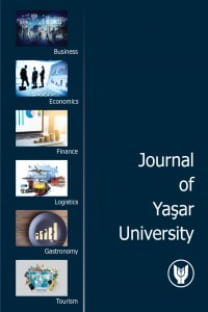YAPISAL GÜÇLENDİRME VE PSİKOLOJİK GÜÇLENDİRME ÖLÇEKLERİNİN GEÇERLİLİK VE GÜVENİLİRLİK ANALİZLERİ
Bu çalışma Laschinger’in Yapısal Güçlendirme Ölçeği (Çalışma Etkililiği Koşulları Anketi / Conditions Of Work Effectiveness Questionnaire-II, CWEQ-II) ile Spreitzer’in Psikolojik Güçlendirme Ölçeğinin (Psychological Empowerment Scale, PES) Türkçe’ye uyarlanması amacıyla gerçekleştirilen geçerlilik ve güvenilirlik analizlerini içermektedir. Analizler sonucunda, yapısal güçlendirme ölçeğinin orijinal halinin oldukça iyi uyum değerleri gösterdiği; bununla birlikte zorlanmış altı faktörlü yapının yapısal güçlendirme kavramını ölçmekte daha başarılı olduğu bulgulanmıştır. Psikolojik güçlendirme ölçeğinin ise orijinal hali uygun bir yapı olarak doğrulanmıştır.
Anahtar Kelimeler:
Yapısal Güçlendirme, Psikolojik Güçlendirme, Geçerlilik, Güvenilirlik,
YAPISAL GÜÇLENDİRME VE PSİKOLOJİK GÜÇLENDİRME ÖLÇEKLERİNİN GEÇERLİLİK VE GÜVENİLİRLİK ANALİZLERİ
This study aims to perform validity and reliability analysis of Laschinger’s Structural Empowerment Scale (Conditions Of Work Effectiveness Questionnaire-II - CWEQ-II) and Spreitzer’s Psychological Empowerment Scale (PES) in order to adapt the both scales to the Turkish language. According to the results, although original structural empowerment scale of CWEQ-II has good fit indices, it is more successfully explained the structural empowerment by forced six-factor structure. Also, psychological empowerment scale is confirmed as an appropriate structure by its original scale.
Keywords:
Structural Empowerment Psychological Empowerment, Validity, Reliability, CWEQ-II, PES.,
___
- Armstrong, K.J. ve Laschinger, H. (2006) “Structural Empowerment, Magnet Hospital Characteristics, and Patient Safety Culture: Making the Link” Journal of Nursing Care Quality, 21(2):124-132. De Cicco, J., Laschinger, H. ve Kerr, M. (2006) “Perceptions of Empowerment and Respect: Effect on Nurses Organizational Commitment in Nursing Homes” Journal of Gerontological Nursing, 49
- Hair, J.F., Black, W.C., Babin, B.J., Anderson, R.E. (2009), Multivariate Data Analysis, 7th Ed., PrenticeHall, London, UK
- Hauck, A., Griffin, M.T.Q. ve Fitzpatrick, J.J. (2011) “Structural Empowerment and Anticipated Turnover Among Critical Care Nurses” Journal of Nursing Management, 19:269-276.
- Hu, S.L.Y. ve Leung, L. (2003) “Effects of Expectancy-Value, Attitudes, and Use of the Internet on Psychological Empowerment Experienced by Chinese Women at the Workplace” Telematics and Informatics, 20(4):365-382.
- Kline, R.B. (2005) Principles and Practice of Structural Equation Modelling. 2nd Edition, New York, The Guilford Press.
- Kluska, K.M., Laschinger, H.K.S. ve Kerr, M.S. (2004) “Staff Nurse Empowerment and Effort-Reward Imbalance” Nursing Leadership, 17(1):112-128.
- Knol, J. ve Van Linge, R. (2009) “Innovative Behaviour: The Effect of Structural and Psychological Empowerment on Nurses” Journal of Advanced Nursing, 65(2):359-370.
- Laschinger, H.K.S., Finegan, J.E., Shamian, J. ve Wilk, P. (2001) “Impact of Structural and Psychological Empowerment on Job Strain in Nursing Work Settings: Expanding Kanter’s Model” Journal of Nursing Administration, 31(5):260-272.
- Laschinger, H.K.S., Finegan, J.E., Shamian, J. ve Wilk, P. (2003) “Workplace Empowerment as a Predictor of Nurse Burnout in Restructured Healthcare Settings” Longwoods Review, 1(3):2
- Laschinger, H.K.S., Finegan, J.E., Shamian, J., Wilk, P. (2004) “A Longitudinal Analysis of the Impact of Workplace Empowerment on Work Satisfaction” Journal of Organizational Behavior, 25(4):527-545.
- Laschinger, H.K.S., Finegan, J. ve Wilk, P. (2009a) “Context Matters: The Impact of Unit Leadership and Empowerment on Nurses’ Organizational Commitment” Journal of Nursing Administration, 39(5):228-235.
- Laschinger, H.K.S., Gilbert, S., Smith, L.M. ve Leslie, K. (2010) “Towards a Comprehensive Theory of Nurse/Patient Empowerment: Applying Kanter’s Empowerment Theory to Patient Care” Journal of Nursing Management,18:4-13.
- Leech, N.L., Barrett, K.C. ve Morgan, G.A (2005) SPSS for Intermediate Statistics: Use and Interpretation, 2nd Edition, New Jersey, Lawrence Erlbaum Associates Inc.
- Mîndrilă, D. (2010) “Maximum Likelihood (ML) and Diagonally Weighted Least Squares (DWLS) Estimation Procedures: A Comparison of Estimation Bias with Ordinal and Multivariate NonNormal Data” International Journal of Digital Society, 1(1):60-66.
- O’Brien, J.L. (2010) “Structural Empowerment, Psychological Empowerment and Burnout in Registered Staff Nurses Working in Outpatient Dialysis Centers” Degree of Doctor of Philosophy, New Jersey, The State University of New Jersey.
- Sarmiento, T.P., Laschinger, H.K.S. ve Iwasiw, C. (2004) “Nurse Educators’ Workplace Empowerment, Burnout, and Job Satisfaction: Testing Kanter’s Theory” Journal of Advanced Nursing, 46(2):134-143.
- Spreitzer, G.M. (1995) “Psychological Empowerment in the Workplace: Dimensions, Measurement, and Validation” The Academy of Management Journal, 38(5):1442-1465.
- Spreitzer, G.M. (1996) “Social Structural Characteristics of Psychological Empowerment” The Academy of Management Journal, 39(2):483-504.
- Spreitzer, G.M., Kizilos, M.A. ve Nason, S.W. (1997) “A Dimensional Analysis of the Relationship between Psychological Empowerment and Effectiveness, Satisfaction, and Strain” Journal of Management, 23(5):679-704.
- Streiner, D.L. (2006) “Building A Better Model: An Introduction to Structural Equation Modeling” The Canadian Journal of Psychiatry, 51(5):317-324.
- Şen, Y. (2008) “Dönüşümcü Liderliğin Psikolojik Güçlendirme ve Örgütsel Bağlılık Üzerindeki Etkilerini Belirlemeye Yönelik Bir Araştırma” Yayınlanmamış Yüksek Lisans Tezi, İstanbul, İstanbul Üniversitesi Sosyal Bilimler Enstitüsü.
- Şimşek, Ö.F. (2007) Yapısal Eşitlik Modellemesine Giriş: Temel İlkeler ve LISREL Uygulamaları, Ankara, Siyasal Basın Yayın Dağıtım.
- Thomas, K.W. ve Velthouse, B.A. (1990) “Cognitive Elements of Empowerment” Academy of Management Review, 15(4):666-681.
- Vacharakiat, M. (2008) “The Relationships of Empowerment, Job Satisfaction and Organization Commitment Between Filipino and American Registered Nurses Working in the USA” Degree of Doctor of Philosophy Nursing, George Mason University, Fairfax VA.
- Wagner, J., Cummings, G., Smith, D. L., Olson, J., Anderson, L., Warren, S. (2010) “The Relationship between Structural Empowerment and Psychological Empowerment for Nurses: A Systematic Review” Journal of Nursing Management, 18:448-462.
- ISSN: 1305-970X
- Başlangıç: 2006
- Yayıncı: Yaşar Üniversitesi
Sayıdaki Diğer Makaleler
AŞIRILIĞIN HABER DEĞERİ: STK FAALİYETLERİ ÜZERİNE BİR İNCELEME
YAPISAL GÜÇLENDİRME VE PSİKOLOJİK GÜÇLENDİRME ÖLÇEKLERİNİN GEÇERLİLİK VE GÜVENİLİRLİK ANALİZLERİ
OLCA SÜRGEVİL EBRU TOLAY MERT TOPOYAN
BEŞ YILDIZLI OTEL RESTORANLARI MÜŞTERİ MEMNUNİYETİ: ERZURUM İLİNDE BİR ARAŞTIRMA
TÜRKİYE DEMOKRASİSİNİN AKSAK AYAĞI: MUHALEFET
GÖKHAN TUNCEL SELAHADDİN BAKAN
TÜRKİYE İÇİN ENFLASYONU HIZLANDIRMAYAN KAPASİTE KULLANIMI ORANI TAHMİNİ
RİSKE MARUZ DEĞER HESABINDA KARIŞIM KOPULA KULLANIMI: DOLAR-EURO PORTFÖYÜ
